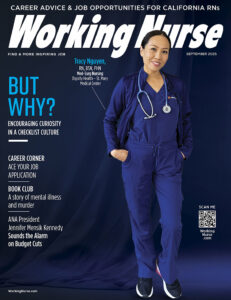Nursing & Healthcare News
A Win-Win Scenario
New survey suggests making time for mentorship could improve retention

A recent survey from the American Nurses Foundation and McKinsey & Company suggests that creating more opportunities for intergenerational mentorship could be a way to improve retention for both early- and later-career nurses.
Different Experience, Common Perceptions
The survey, conducted in September and October 2023, asked 5,772 nurses of varying experience levels about their interactions with nurses of other generations and how those relationships affect their feelings about their work.
Respondents were divided into three categories: early-tenure (less than five years’ nursing experience), midtenure (5–21 years’ experience), and most-tenured (21+ years’ experience).
About three-fourths of early-tenure nurses said they enjoy working with more experienced nurses.
Three-fourths of midtenure and most-tenured nurses said they enjoy working with early-tenure colleagues, and almost three-fourths said they find it energizing or personally fulfilling.
The data reaffirms what many already know: nurses thrive with intergenerational relationships.
Not Enough Time
The problem for nurses of all experience levels is time. More than one-third of early-tenure nurses feel their more-experienced colleagues don’t have the time or capacity to train or coach them.
Similar percentages of midtenure and most-tenured nurses said they really don’t have the time for coaching and mentorship.
This lack of time is most pronounced among most-tenured nurses, including those close to retirement.
Forty-three percent of most-tenured nurses said they don’t have the time for training or coaching, compared to 36 percent of midtenure nurses.
More Formal Programs Needed
Respondents were asked what kind of mentorship and training opportunities they would most like to see. The leading preferences among nurses of all experience levels were: 1) more extensive workplace training for newer nurses, and 2) more formal mentorship programs that pair newer nurses with more experienced colleagues.
Providing more such formalized opportunities for mentorship and coaching could also be a way to persuade nurses who have already retired to return.
Thirty-one percent of retired nurses said they’d consider coming back to bedside nursing if they had the chance to mentor other nurses, while 34 percent said they’d consider returning to become educators.
The Many Benefits of Flexible Scheduling
However, time remains a major challenge. The survey’s authors say one answer could be offering greater scheduling flexibility, which is a key priority for both early-tenure and most-tenured nurses.
Almost one-third of respondents of all experience levels said their current employer offers no scheduling flexibility, and many said they were unsatisfied with the options that were available.
Forty-six percent of early-tenure nurses and 46 percent of retired nurses contemplating a return to the bedside said they’d like the ability to set their own schedules.
This suggests opportunities for employers to use scheduling flexibility as a way to attract and retain younger nurses. Such a policy would also maximize the transfer of knowledge and skills from older cohorts to newer generations.
AARON SEVERSON is the associate editor of Working Nurse.
In this Article: ANA, Nursing Workforce






